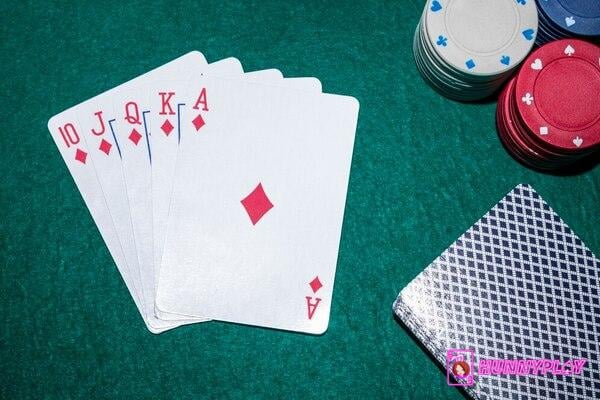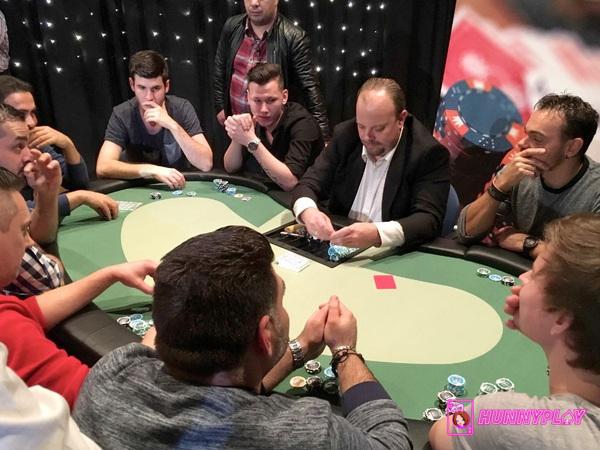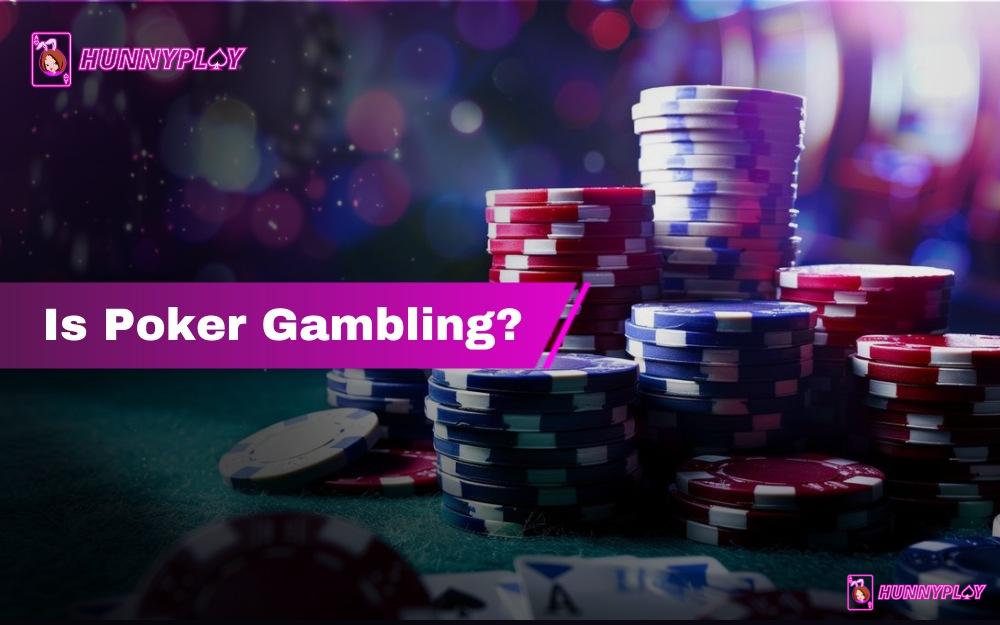Poker has long been a subject of debate: is Poker gambling, or is it a game of skill? In this article, we’ll dive deep into the nature of poker, exploring whether it is indeed a gambling game, the role of skill versus luck, and how it stacks up against other casino games.
Is Poker Gambling?
What is Gambling?
Gambling is generally defined as the act of wagering money or something of value on an event with an uncertain outcome, with the primary intent of winning additional money or material goods. Traditional gambling activities include casino games like roulette, slot machines, and blackjack, as well as sports betting and lottery games.
Elements of Gambling in Poker
Is poker gambling? Poker involves placing bets and has elements of chance, such as the cards dealt and the community cards revealed. These characteristics align with the fundamental aspects of gambling, where money is wagered on uncertain outcomes.
Why Poker Isn’t Gambling
Despite the gambling elements in poker, many argue that it is not purely a game of chance. Poker requires a significant amount of skill, including knowledge of the game, strategic thinking, psychological insight, and the ability to make decisions based on incomplete information. Successful poker players consistently win over time, which suggests that skill plays a critical role.

Is Poker a Game of Skill or Luck?
Luck in Poker
Luck undeniably plays a significant role in poker. The randomness of the card shuffle and the distribution of cards can lead to unpredictable outcomes in the short term. For instance, a beginner might win a hand against an experienced player purely due to a fortunate draw.
This aspect of the game fuels the debate on whether poker is purely a game of chance or skill. Over the long run, however, this luck tends to even out.
While luck can cause swings in the short term, the random nature of the cards means that everyone will experience good and bad runs. This inherent randomness often leads people to question, “Is poker gambling?” The answer lies in the balance between luck and skill.
Skill in Poker
Skill in poker encompasses a deep understanding of game theory, keen insight into when to bet, fold, or raise, the ability to read opponents, and effective bankroll management. Skilled players consistently analyze probabilities, opponent behavior, and game dynamics to make decisions that maximize their expected value.
Unlike games of pure chance, where outcomes are solely dictated by luck, poker allows players to exert a significant degree of control over their results through strategic play. This is why experienced players tend to win more consistently than novices. The application of skill transforms poker from a simple game of luck to a complex strategic contest.
This nuanced interplay between luck and skill is central to the ongoing debate: “Is poker gambling?” While there is an element of gambling involved, the presence of skill shifts poker closer to a sport of strategy.
The Legal Landscape of Poker
The legal status of poker varies around the world and often depends on whether it is classified as a game of skill or chance. In many jurisdictions, games of skill are treated differently from games of chance, leading to varying regulations for poker.
In the United States, for example, the legality of online poker is determined at the state level, with some states allowing it and others prohibiting it. Understanding the legal framework in your area is crucial for anyone looking to play poker, especially online.

Poker vs Other Gambling Games
Is Poker Luck or Skill?
When comparing poker to other casino games, its strategic depth and complexity set it apart. Games like roulette and slot machines are almost entirely based on chance, with outcomes determined purely by random events such as the spin of a wheel or the draw of a lever.
In contrast, poker is a game where both chance and skill play significant roles. While the randomness of the card shuffle introduces an element of luck, the strategic decisions made by players are crucial to long-term success.
Players must understand probabilities, read opponents, and employ tactics to outmaneuver others at the table. This blend of luck and skill in poker raises the question, “Is poker gambling?” While it involves elements of gambling due to the luck factor, the significant role of skill means that knowledgeable players can consistently outperform others.
House Edge
Another critical difference between poker and other casino games is the concept of the house edge. In most casino games, the house has a built-in advantage that ensures the casino profits over the long run. For example, in games like blackjack, craps, or baccarat, specific rules are designed to favor the house, giving it a mathematical edge over the players.
Poker, however, operates differently. In poker, players compete against each other rather than the house. The casino typically takes a small percentage from each pot, known as the rake, to cover operational costs and ensure profitability. This structure means that the primary contest in poker is between the players themselves.
Social Interaction
Poker is also distinct from many other casino games due to its social aspect. Unlike games of pure chance where interaction is minimal, poker requires players to engage with and read their opponents. This psychological element adds depth to the game, as players must decipher body language, betting patterns, and other subtle cues to gain an advantage.
This social interaction not only enhances the enjoyment of the game but also provides skilled players with additional opportunities to gain an edge. Bluffing, for example, is a critical skill in poker that relies on convincing opponents to make decisions based on false information.
The ability to successfully bluff or read a bluff can significantly impact the game’s outcome, making poker a richer and more complex experience compared to games that rely solely on luck.

Tips for Playing Poker Responsibly
- Set a Budget: Determine how much money you are willing to risk before you start playing and stick to that budget. This helps prevent significant financial losses and ensures that your gambling remains a fun activity.
- Play Within Your Limits: Choose stakes that are appropriate for your skill level and bankroll. Avoid playing in games where the buy-in or stakes are too high for your budget or experience.
- Take Breaks: Playing poker for extended periods can lead to fatigue and poor decision-making. Take regular breaks to stay fresh and focused.
- Learn Continuously: Improving your poker skills requires continuous learning. Study strategy guides, watch professional games, and practice regularly to enhance your understanding of the game.
- Know When to Walk Away: Recognize when you’re on a losing streak or feeling frustrated. It’s important to walk away and avoid chasing losses, which can lead to even more significant losses.
Poker Gambling FAQs
Is Poker Gambling?
Yes, poker involves elements of gambling, such as wagering and the role of chance in the outcome. However, it also requires significant skill, which differentiates it from pure games of chance.
Is Poker a Game of Luck or Skill?
Poker is a blend of both skill and luck. While luck influences the outcome in the short term, skill is the determining factor for long-term success.
What Makes Poker Different from Other Casino Games?
Unlike most casino games, poker pits players against each other rather than the house, making skill a critical component. It also involves social interaction and strategic thinking.
Can I Make a Living Playing Poker?
Yes, some players make a living from poker, but it requires a high level of skill, discipline, and bankroll management. Success is not guaranteed, and it is important to understand the risks involved.
How Can I Improve My Poker Skills?
Continuous learning and practice are essential. Study strategy guides, watch professional players, and participate in games to gain experience and improve your skills.
Is Online Poker Legal?
The legality of online poker varies by jurisdiction. It is essential to check the laws in your area to ensure that you are playing legally.
What is the House Edge in Poker?
In poker, the house edge comes from the rake, which is a small percentage taken from each pot. Unlike other casino games, the primary competition is between players, not against the house.
Conclusion
Poker is a fascinating game that blends elements of gambling with skill, strategy, and social interaction. While luck plays a role, the consistent success of skilled players underscores the importance of knowledge and experience in the game. Whether you view poker as gambling or a game of skill, it offers a unique and engaging challenge that continues to attract players worldwide.




















